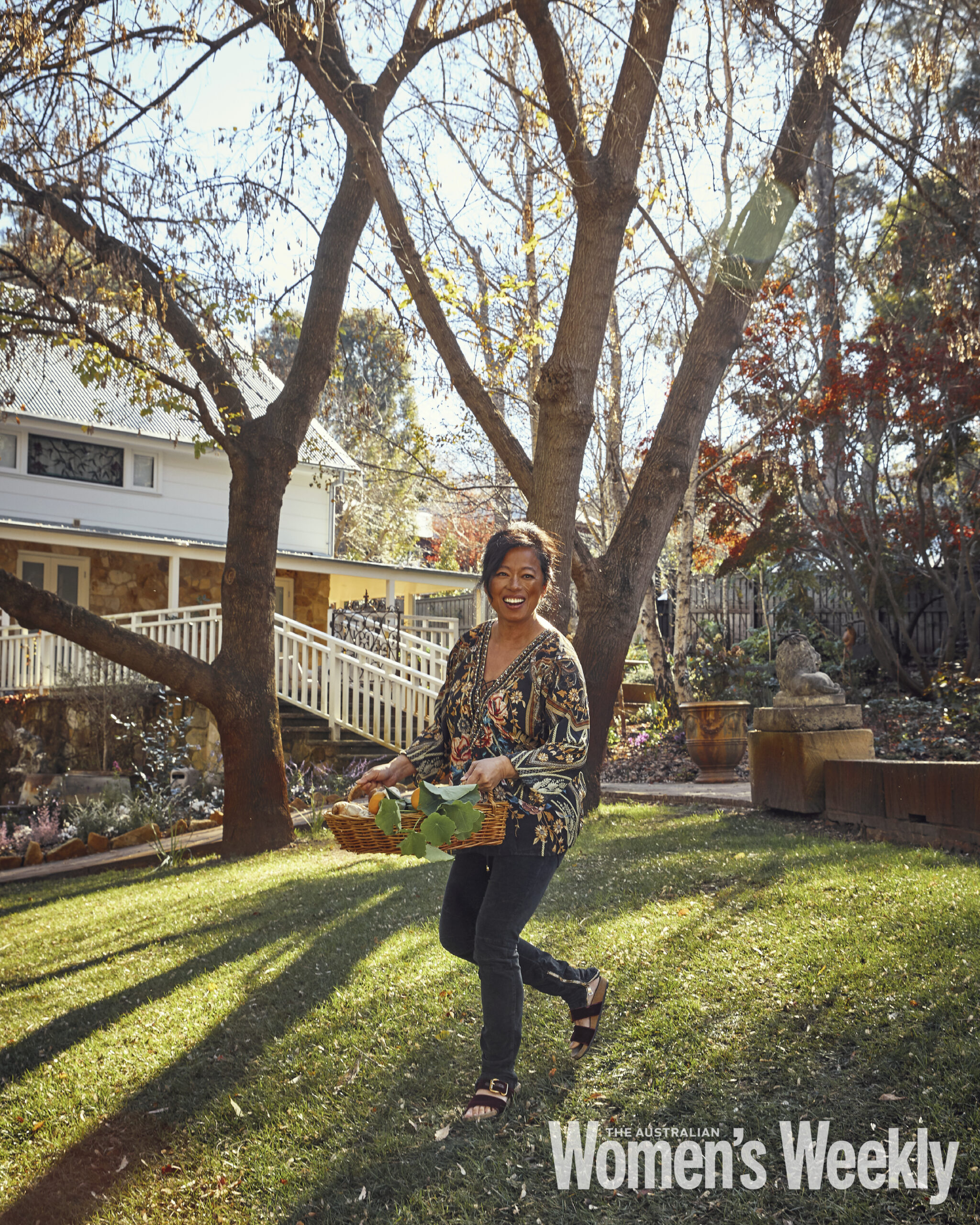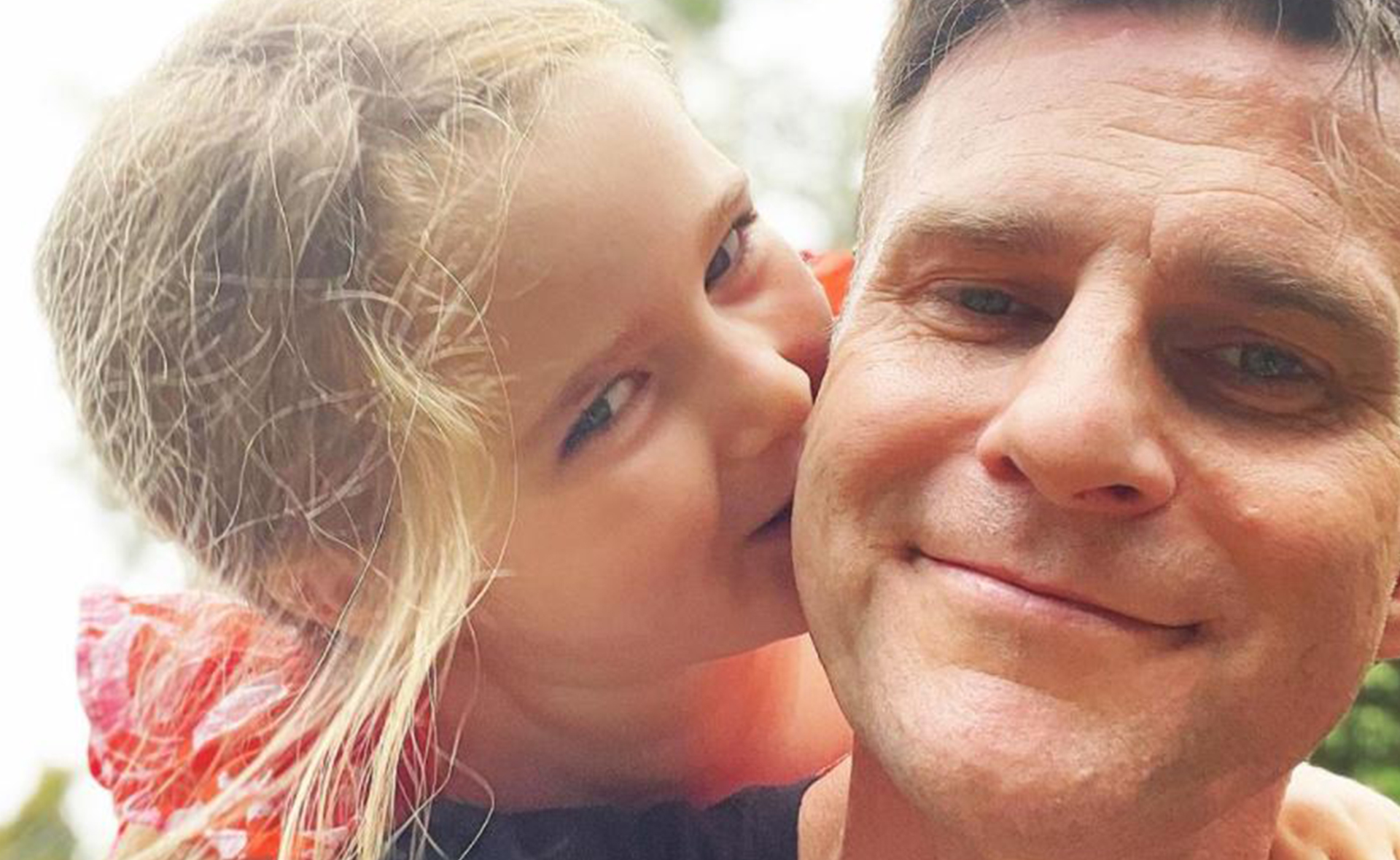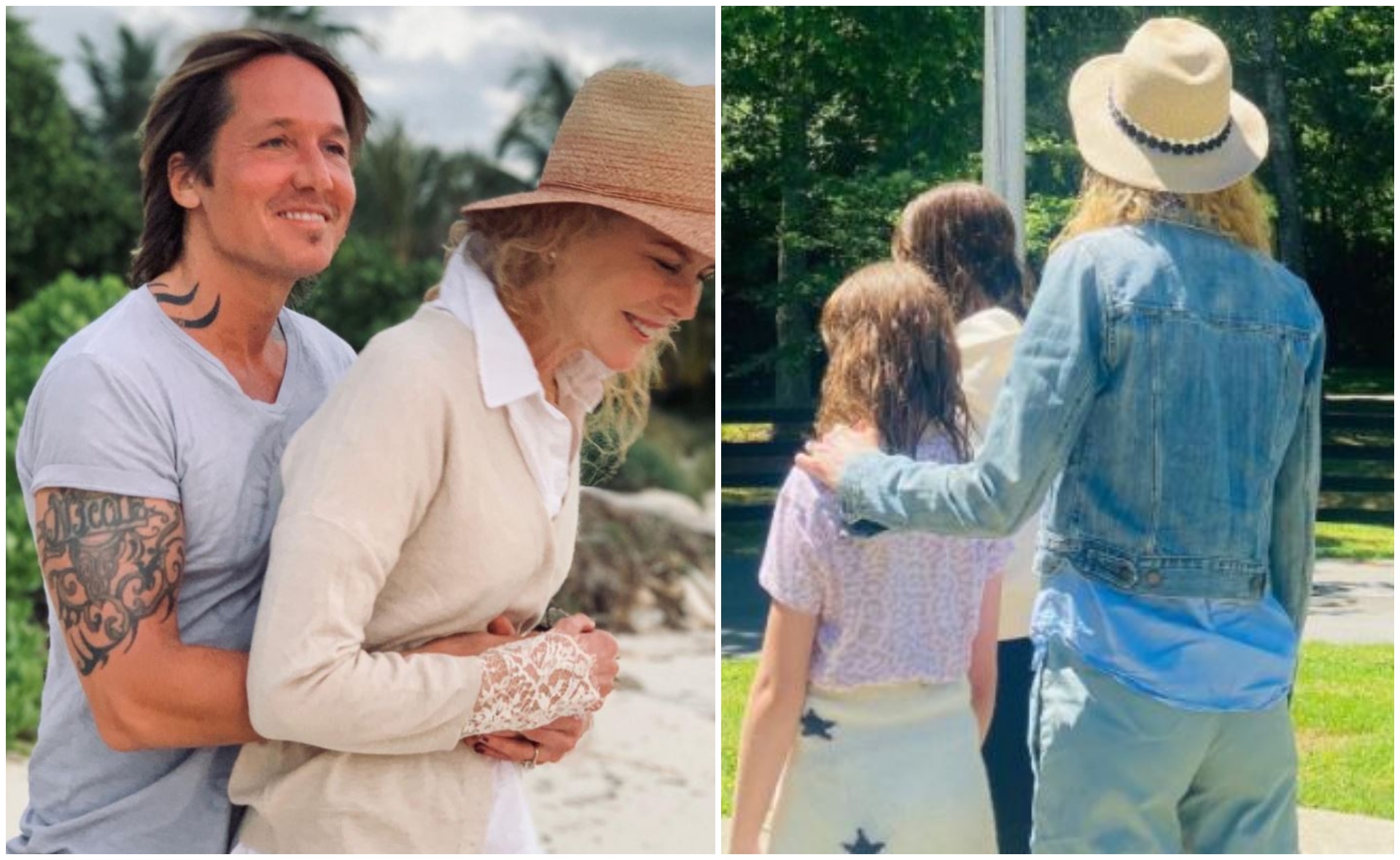The first time I met Jane Barnes was in the kitchen of her rambling, white weatherboard farmhouse in Bowral, NSW.
It was 1993, around the time her husband, Jimmy, released his sixth solo album, Heat.
She wore expensive jeans and a little black tee, and the house smelt of wood smoke and freshly baked bread.
Jane and her sister Jep were arranging immense platters of food on a kitchen island that seemed to stretch on forever. It needed to because she had a whole tribe of mouths to feed.
All four little Barneses – Mahalia, who was 11; Eliza-Jane (aka EJ), nine; Jackie, seven; and Elly-May, four – were skidding across polished floorboards in socked feet.
A nanny and Jep’s toddlers, Jesse and Lily, were in hot pursuit. There was a band (or maybe two) recording in the studio downstairs with Jep’s husband, Mark “Diesel” Lizotte. And an old family friend was staying in the guest quarters, ostensibly to dry out.
Mid-afternoon there was a knock at the door and in strolled a couple of saffron-clad monks. Jane was trying to keep Jimmy on, if not the straight and narrow, at least the middle path, and the monastery at nearby Bundanoon had become part of this noisy, welcoming, eclectic family too.
On this particular day, it was a hullabaloo, but that was the way Jane liked it.
Perhaps it channelled the spirit of the family compound in Bangkok where she spent her first five years, surrounded by the laughter of cousins, the love of aunties and uncles, and the aroma of chilli, lemongrass and galangal emanating from a dozen Thai kitchens.
“I have amazing memories of those years,” Jane tells The Weekly, sitting by the fire and reminiscing in another Southern Highlands homestead all these years later.
“My mother was one of 26 children; my grandmother was one of seven wives. So there were always other children to play with. The extended family was just so important to my upbringing.”

‘The extended family is so important to my upbringing.’ Jane Barnes on her early childhood memories.
(Alana Landsberry)Her grandfather was a wealthy businessman who had moved from China to Thailand just prior to the communist revolution. He’d left two wives behind in his homeland, and “my grandmother was his first Thai wife,” Jane says.
Having many wives was a symbol of wealth, and Jane’s grandfather provided for the family very comfortably. Jane’s mother, Kusumphorn Visuthipol (now known simply as Phorn), was sent to boarding school in England.
“She was bilingual, very beautiful and well educated, and she loved to travel,” Jane says. While in the UK, Phorn met and later married a young Thai man, Suvit Dejakasaya, with whom she had three daughters – Jane, Jep and Kaye – in quick succession.
“They were just young, wild people,” Jane says of her parents, whose marriage only lasted until she was four years old. “I don’t know why they split up, but I remember them fighting over us.
They both wanted custody of the children and my mother won … My mother is strong, wilful, I guess. She is very much her own person, and she always did whatever she wanted to do.”
Jane’s memories of the divorce are not, however, traumatic because, she says, “living in the compound, we weren’t isolated. There was always somebody to help. The extended family keeps you connected with other safe adults, so if your parents are having problems, you don’t get scarred by it so much. We still felt safe and that’s what little children need most.”
Not long after the divorce, Phorn fell in love with a young Australian diplomat, John Mahoney, who was on his first posting in Bangkok.
When he was transferred, she went with him to Canberra, and her girls followed – Jep and Kaye in the care of their big sister.
“When you’re the eldest,” Jane says now, “you tend to look after the little ones. I was five, Jeppy was probably still in nappies and there was Kaye in between, and we travelled to Australia unaccompanied. My parents had already come to set up our household. So it just came naturally to me to be confident and self-reliant.”
Both that early responsibility and the headstrong family gene might account for the reputation she’d later develop as something of a lioness where Jimmy and her own children were concerned. Jimmy has often commented on Jane’s courage.
“I think that’s part of being the eldest in the family,” she admits. “I’m a very positive person and I’m not afraid of anything. I don’t see life in a frightening way, and I think that’s a blessing. I feel very safe and secure in myself, so I think Jimmy and my family do feel safe with me.”
The Mahoneys’ next posting was to Rome, and from there they moved regularly.
Jane grew up in Italy, Russia, New Guinea, Kiribati, Malta, Malaysia. “I was educated all around the world,” she says. Everywhere they stopped, she picked up at least one new language, “but the common language for me was maths. That was my forte because that doesn’t change between countries.”
Jane finished high school and went on to university, which she approached with enthusiasm but not a lot of direction, flitting between pure mathematics, comparative religion, art history, psychology and the five languages that she knew and loved. She was in the final year of a very patchwork degree when she met Jimmy Barnes.

‘I’m a very positive person and I’m not afraid of anything.’ Jane on being the eldest in the family.
(Alana Landsberry)It was a hot, dry Canberra night in November 1979. Jane was sitting on the floor at a student party, playing the guitar as it was passed around and singing (Willin’ by Little Feat and Puff the Magic Dragon by Peter, Paul and Mary).
A bunch of musicians wandered in – Buzz Bidstrup and Chris Bailey from The Angels, and Jimmy, the scruffy young lead singer of a band called Cold Chisel.
By her own admission, Jane was a pretty naive 21-year-old.
“I’d probably been living under a bit of a rock,” she laughs.
“Just getting assignments in, doing homework. I would go to Russian Club or Chess Club at university. I’d never go to a pub and stand around and watch live music. I remember some of my friends were seeing bands, and I would be the designated driver and I’d do my homework in the car. I didn’t date a lot … I was so naive.
“So, suddenly meeting these drastically different, creative people, it was a whole new life experience for me.”
Jimmy was mesmerised – “completely smitten” – and tried to catch her attention across the room.
He hung around the party to the bitter end, until finally Jane called him a taxi and escorted him to the door. If he went home now and behaved himself, she said, she’d meet him at the airport in the morning and give him her phone number.
She was true to her word, and thus began a relationship that has spanned 42 years (40 years of marriage) and seems forged in fire.
Did she imagine at the time that the mop-top boy in jeans and sneakers would be the love of her life? To be honest, no.
“I didn’t look at things like that,” Jane admits. “It was just that I felt different with him. I felt comfortable, he made me laugh. He was my favourite person to be with, but it wasn’t set in stone.”

IIt was just that I felt different with him. I felt comfortable, he made me laugh.” Jane on the love of her life, her husband Jimmy Barnes.
(Alana Landsberry)Even so, as time went on, Jane began spending more time with Jimmy and less time at uni, until finally she stopped going altogether. A crisis of conscience ensued.
“I was worried about getting into trouble with my parents,” she says.
So she flew to Japan, where they were living, to make her case to them about dropping out of uni, and to take a break from what had become a pretty intense introduction to the rock’n’roll lifestyle.
Jimmy famously wrote the Cold Chisel song Rising Sun (“the Rising Sun just stole my girl away”), about Jane’s departure.
And indeed he did “catch a plane and steal her back again”– eventually.
After a fairly uncomfortable couple of weeks at the embassy with the Mahoneys, Jimmy returned to Sydney and Jane followed six months later.
They moved into a terrace house in Paddington and tied the knot in a registry office in May 1981. Mahalia was born barely a year later and changed both Jimmy and Jane’s lives forever. For both parents, family became a guiding star.
“A lot of people ask me if I feel I’ve given up anything. I haven’t,” Jane says honestly.
“I’ve always done whatever I’ve wanted. It’s as simple as that. I’ve always carved out my own life. I was a bit oblivious to … or I didn’t really know what this rock scene was for a while. I still feel a bit uncomfortable about the way people see it. Maybe that’s how you survive things – I don’t know. But I did know that I loved having children, I loved being a mother. For me, having children was happiness. Does that make sense?
“Sometimes my kids will say, ‘Mum, you’ve never worked a day in your life,’ and I’m like, ‘Well, actually, this is a job.’ I haven’t had a career, but I’m happy when I fill in a form that asks me for my occupation and I say ‘wife and mother’ and now ‘grandmother’. I think that’s one of the most important jobs in the world – if not the most important – to bring up good humans. It’s my passion. That’s who I am.”
Jane and Jimmy’s toughest time was when their youngest, Elly-May, was born almost three months premature.
“That was like another life for us,” she says, still sombre.
“They said to us there was a 50 per cent chance of this baby surviving. Anything else you’ve been through in your life is …It really puts life in perspective. They would take her blood every two hours; they had cannulas all through her body. She was just kept alive. There is nothing worse than sitting there in the hospital, thinking, ‘Oh my God, what’s going to happen if we lose this life?’ We’re lucky she stayed with us, but she has cerebral palsy, which is an ongoing thing for her and for all of us.”
Jane has raised not only four good people but a close-knit family, founded on forbearance, trust, resilience and a whole lot of love. And when the going gets tough, they have always pulled together.
Jane casts her mind back to the early 2000s and another family crisis.
She and Jimmy were, she says, “in the thick of our addiction” to booze and drugs and not coping at all. The kids were in their late teens and early 20s by then and, Jane says with quite some pride, “they staged an intervention – the kids and my family, together. They said to us, ‘Mum and Dad, you know what, we just need to let you know …’
“And that’s when we decided to go to rehab. It really worked. And I think that’s a sign of what makes a good family. It’s not one that’s perfect, but it’s one that has been there when we’ve needed each other’s support – and all of us have at different times. Those are the important things for this family – when we can help each other.”

‘For me having children was happiness” Jane on her children.
(Alana Landsberry)In recent years, the family – and particularly Jane – have drawn around Jimmy as he’s navigated the process of writing his memoirs and coming to terms with a childhood of trauma and abuse.
“He is the love of my life,” Jane says. “It made me sad to think that had happened to someone who I loved so much. It’s a huge journey that he’s been on and thank God he’s done it.”
In his recent book, Killing Time, Jimmy wrote: “Jane always sees things clearer than I do, and the world always seems a better place to her than it does to me. She would help me make sense of the feelings that lay dormant inside my heart, the feelings I feared might explode and destroy me. Maybe she could make the pain go away.”
Did she feel Jimmy’s reliance on her as a heavy burden or a responsibility?
“No,” Jane insists, “never. I didn’t feel that pressure because I didn’t know [how much he was relying on me]. What has come out of all those books is that I’m just in admiration of this man being able to say, ‘I have fears’; to be able to articulate fear …
“I don’t take things personally. That’s the opposite of the way Jimmy travels. It was [Jimmy’s eldest son] David Campbell who said to me: ‘He walks around like he has no skin on.’ And I said, ‘What? But he’s so loved. He’s got everything. He’s so clever and talented and funny.’ He is vulnerable always because of all the trauma he had, but it’s really great that he’s addressed it.
“There’s part of Jimmy that’s always been the same to me. When you love somebody the way that I love him … He’s still the same Jimmy, but he’s not exhausted and he’s not burdened and he’s not trying to escape. He’s really able to be present. All the family, his friends, his peers appreciate that. That’s the difference with not dwelling on it. Getting it out and moving on.”
Jane sits quietly for a moment, looking out through an immense picture window, watching a wide, green river tumble over boulders at the end of her backyard.
Then the door swings open and Mahalia’s youngest, Rosie (aged four), runs in, flings herself at her grandmother and lifts her from her thoughts, chatting about everything under the sun, from her favourite books to her latest obsession – unicorns. She and her grandma plainly adore each other.
Rosie’s sister Ruby, 11, brought tears to eyes all through the Rod Laver Arena in March when she joined her mother and grandfather on stage and sang like an angel at the state funeral of the Barnes family’s longtime champion and friend, Mushroom Records founder Michael Gudinski.
There has been a lot of sadness and a lot of weight this year, even for Jane’s capable shoulders.
“March was like a month of hell for us,” she says quietly. “Four funerals, and Elly was in hospital for a month.”
A talented singer, feisty cabaret performer and mother to seven-year-old Dylan, Elly-May nonetheless lives with chronic pain and the effects of cerebral palsy.
At 32, she’s just had surgery on both her Achilles tendons. But Jimmy and Jane have built a house for her on their property, so a helping hand will never be far away.
Also in March, Jane’s parents moved into aged care, thankfully nearby in the Southern Highlands. And Jimmy was there to lend a hand.
“If I’ve ever needed Jimmy, it’s been in the last few years,” Jane admits, “since my mother started getting dementia, and just recently when we moved my parents out of their home. Jimmy has been there for me. He visits my parents, he takes the dog with him and he goes to visit the other residents as well. He’s such a lovely, sweet man.”
In the midst of it all, COVID restrictions began lifting and the family’s bands hit the road again.
The Jane Barnes Band had seen fans through the first year of the pandemic. Their friends-and-family renditions of classic hits charted Jane’s growing confidence on guitar, vocals, bagpipes and tin flute, and posted online, they attracted more than 100 million views. Some video highlights have been compiled as a gift to accompany Jimmy’s new album, Flesh and Blood.
Also during the pandemic, Jimmy produced his second children’s book, Rosie the Rhinoceros (for his grandchild of the same name), and Jane and Jimmy put the finishing touches to a family cookbook (Where the River Bends: Recipes and Stories from the Table of Jane and Jimmy Barnes), to be published in October by HarperCollins.
The Jane Barnes Band and these other projects imparted a sense of purpose to even the darkest days. And then, to Jane’s absolute delight, there was another grandchild. When The Weekly arrives, Jane and Jimmy have just returned from a week in New Zealand, visiting daughter EJ and a new grandson, Theodore Darling.
“It was miraculous,” Jane says.
“We hadn’t seen EJ for so long, and this was her first baby. Then New Zealand opened up on April 18th and she was due on the 21st. I love little ones – they’re just pure energy, fresh from heaven.”
Through the good times and the bad, for Jane, life is always about family.
“You know the way we are,” she says, bundling Rosie up in a hug and following her to the kitchen, to see Jimmy and Mahalia, and put a roast on for dinner.
“We have extended family and very close friends who are like family, and there’s nothing more important to me.
“My favourite time of year is when the family is all here for Christmas, and the cousins are playing and fighting and laughing together – all different ages. That’s what I really remember about being part of a big family growing up. Whatever happens, we all look after each other.”
Read more in the July issue of The Australian Women’s Weekly – on sale now.




.png)